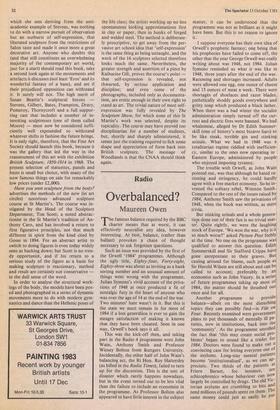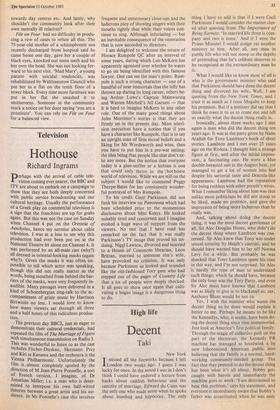Radio
Overbalanced?
Maureen Owen
The famous balance required by the BBC charter means that at worst, it can effectively neutralise any idea, however interesting. At best, balance, (rather than ballast) provokes a chain of thought necessary to ask forgotten questions.
Such an issue was provided by the first of the Orwell '1984' programmes. Although the ugly title, Eighty-four, Forty-eight, Eighty-three was about as inviting as a bank sorting number and an unusual amount of things went wrong with the programme, Julian Symons's vivid account of the priva- tions of 1948 at once produced a fit of nostalgic fury in the heart of anyone who was over the age of 14 at the end of the war. Two minutes' hate wasn't in it. But this is the state we must remain in for most of 1984 if a lost generation is ever to gain the meagre satisfaction of making it known that they have been cheated. Seen in one way, Orwell's book says it all.
This was the kick-off then, and taking part in the Radio 4 programme were John Wain, Anthony Smith and Professor Witney Bolton from Ruttgers University. Incidentally, the other half of John Wain's balancing act, the Rt Hon. Roy Hattersley (as billed in the Radio Times), failed to turn up for the discussion. This is the sort of disaster which rarely happens nowadays, but in the event turned out to be less vital than the failure to include an economist in the programme. As Professor Bolton also appeared to have little interest in the subject
matter, it can be understood that the programme was not as brilliant as it might have been. But this is no reason to ignore it.
I suppose everyone has their own idea of Orwell's prophetic fantasy; one being that his prophecies have failed to come off, the other that the year George Orwell was really writing about was 1948, not 1984. Julian Symons reminded us what it was like in 1948, three years after the end of the war. Rationing and shortages increased. Adults were allowed one egg, one ounce of cheese and 13 ounces of meat a week. There were shortages of shoelaces and razor blades, pathetically shoddy goods everywhere and gritty soap which produced a black lather. When there was a bad winter the socialist administration simply turned off the cur- rent and electric fires were banned. We had whalemeat, alleged by Dr Edith Summer- skill (one of history's most bizarre liars) to be like steak, terrible gin and stinking urinals. What we had in 1948 was a totalitarian regime riddled with inefficien- cy, similar to the ones now operating in Eastern Europe, administered by people who enjoyed imposing tyranny.
The trouble with Orwell, as John Wain pointed out, was that although he hated ra- tioning and stringency, he could hardly agree with a free market economy. So he in- vented the solitary rebel, Winston Smith. Compared to the rest of the issues raised by 1984, Anthony Smith saw the privations ol 1948, when the book was written, as mere trivia.
But stinking urinals and a whole genera- tion done out of their fun is no trivial mat- ter. Quite rightly, we were the laughing stock of Europe. 'We won the war, why is it so much worse?' asked Picture Post feebly at the time. No one on the programme was qualified to answer, this question. Edith Summerskill and Sir Stafford Cripps have gone unrepentant to their graves. But casting around for blame, such people as Sir Harold Wilson are still about and can be called to account; preferably by an economist such as John Vaizey. In a series of future programmes taking up most ot 1984, the matter should be thrashed out once and for all.
Another programme to provide balance—albeit on the most disturbing topics they can possibly find—is File on Four. Recently examined were government plans to put thousands of mentally ill Pa- tients, now in institutions, back into the 'community'. As the programme unrolled the fact that 'this may create social pro- blems' began to sound like a trailer for 1984. Doctors were found to make out a, convincing case for letting everyone out ot the asylums. Long-stay mental patients become 'institutionalised', as we can ap- preciate. Two thirds of the patients at Friern Barnet, for instance, are schizophrenics whose behaviour can now largely be controlled by drugs. The old Vic- torian asylums are crumbling to bits and need millions of pounds spent on them. The same money could just as easily be Pot
towards day centres etc. And lastly, why shouldn't the community look after their own mentally ill relatives?
File on Four had no difficulty in produ- cing a row of cases to refute all this. The 75-year-old mother of a schizophrenic son recently discharged from hospital said he came home one day, gave her a couple of black eyes, knocked out some teeth and hit her over the head. She was not looking for- ward to his next visit. `Mad Mary', a young patient with suicidal tendencies, was rehabilitated by Walthamstow Council who put her in a flat on the tenth floor of a tower block. Every time more furniture was put in her flat she smashed it . to smithereens. Someone in the community stuck a notice on her door saying 'you are a prostitute'. You can rely on File on Four for a balanced view.











































 Previous page
Previous page